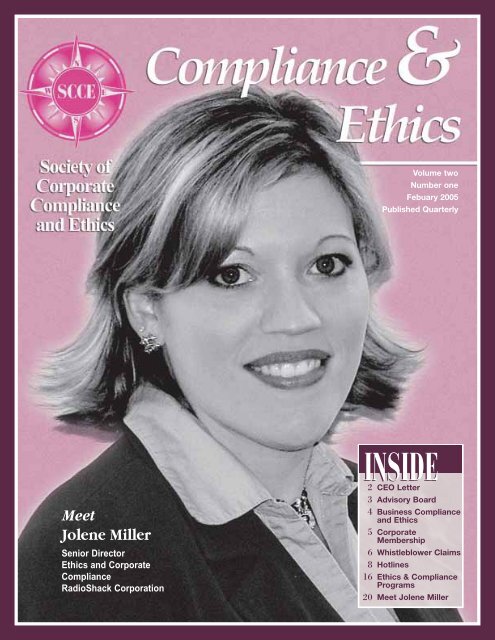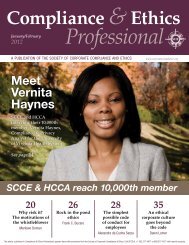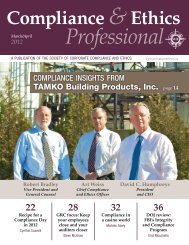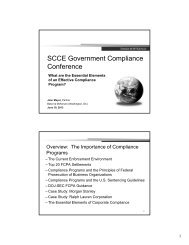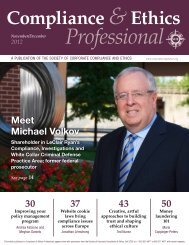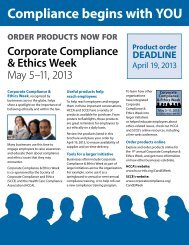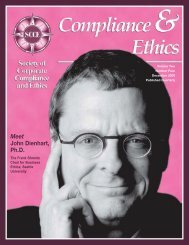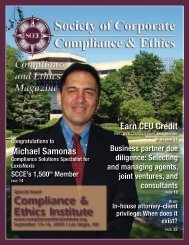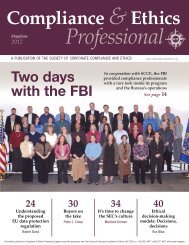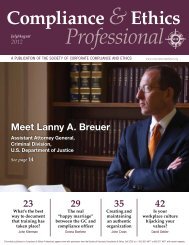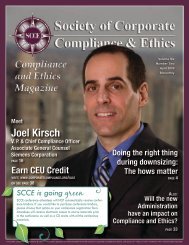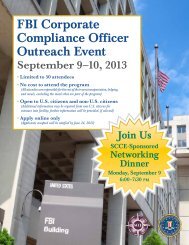JM - Society of Corporate Compliance and Ethics
JM - Society of Corporate Compliance and Ethics
JM - Society of Corporate Compliance and Ethics
- No tags were found...
Create successful ePaper yourself
Turn your PDF publications into a flip-book with our unique Google optimized e-Paper software.
Volume twoNumber oneFebuary 2005Published QuarterlyMeetJolene MillerSenior Director<strong>Ethics</strong> <strong>and</strong> <strong>Corporate</strong><strong>Compliance</strong>RadioShack CorporationINSIDECEO Letter2345681620Advisory BoardBusiness <strong>Compliance</strong><strong>and</strong> <strong>Ethics</strong><strong>Corporate</strong>MembershipWhistleblower ClaimsHotlines<strong>Ethics</strong> & <strong>Compliance</strong>ProgramsMeet Jolene Miller
EnablingROY SNELLWe are a society <strong>of</strong>enablers. We tell peoplewho have bad habitsthat they have a disease. As parents, we say: "Boys willbe boys" or "girls will be girls!" Sometimes we pay thous<strong>and</strong>s<strong>of</strong> dollars to have outsiders come in <strong>and</strong> tell uswhat we want to hear. We hire people who tell us thatthe regulations are unfair, too complicated, <strong>and</strong> that theregulators don't know what they are doing. Pointing outthe shortcomings <strong>of</strong> others gives us comfort. Enablinghelps ensure that we don't change, which, <strong>of</strong> course, isOK in most cases, but potentially disastrous in others.differently. I look at it as anembarrassing <strong>and</strong> tough conversationthat could result in ideas. Ilook at it as an opportunity tochange <strong>and</strong> look good in front <strong>of</strong>all the people expecting me to perform.I look at it as an opportunityfor improvement. When theimprovement is implemented, I shamelessly take fullcredit for it. Despite the fact that it was not my idea, Itake credit for it because I endured the criticism. I overcamethe temptation to tell them, "I am in charge here.You are not. Get lost!" That is worthy <strong>of</strong> some credit.<strong>Compliance</strong> doesn't tell people what they want to hear.We tell people what they need to hear. We opt for shortterm pain over long term pain. We step up. We makean effort to eliminate conflicts <strong>of</strong> interest. We hire peopleto tell us what we need to hear, not what we want tohear. This is a much tougher road.The problem is that enabling is not helpful. Enablingdoes not encourage action. Enabling does not encouragestepping up to painful <strong>and</strong> unpopular decisions. Weshould embrace our bad habits/problems <strong>and</strong> deal withthem. We should not hire people to tell us we are OKwhen we are not. It's delaying the inevitable. Is it possiblethat the compliance/ethics pr<strong>of</strong>ession would not behere today if it were not for enabling? If people wouldfind <strong>and</strong> fix their problems, would we need a departmentthat ensures that they do?I struggle with this, like anyone else, but I am winningthe battle slowly. After 50 years <strong>of</strong> criticizing criticizers, Iam beginning to embrace some <strong>of</strong> it. When peoplepoint out mistakes or missed opportunity, I try to view it<strong>Compliance</strong> <strong>and</strong> ethics programs are becoming commonplacein business because there was a feeling that somethingwas missing. What was missing? What was missingwas someone whose sole purpose was to stop theenabling <strong>and</strong> address the issues. Someone who wouldaddress the issues regardless <strong>of</strong> the potential negativeimpact on their career. What was missing was someonein the organization who was free <strong>of</strong> conflicts <strong>of</strong> interest;someone who had no responsibility other than to get itright; someone who would respond to a complaint withoutbias. That is the heart <strong>and</strong> soul <strong>of</strong> the compliancepr<strong>of</strong>ession. ■SCCE’SSCCE exists to champion ethicalpractice <strong>and</strong> compliance st<strong>and</strong>ardsMISSION in the corporate community <strong>and</strong>to provide the necessary resources for compliance pr<strong>of</strong>essionals<strong>and</strong> others who share these principles.February 20052SCCE • 5780 LINCOLN DRIVE, SUITE 120 • MINNEAPOLIS, MN 55436<strong>Society</strong> <strong>of</strong> <strong>Corporate</strong> <strong>Compliance</strong> <strong>and</strong> <strong>Ethics</strong> • (888) 277-4977 • www.corporatecompliance.org
ONTHECALENDARAdvisory BoardPublisher:<strong>Society</strong> <strong>of</strong> <strong>Corporate</strong> <strong>Compliance</strong><strong>and</strong> <strong>Ethics</strong>, 888/277-49774th Annual <strong>Corporate</strong>Responsibility SymposiumA National Cross-Industry Symposium designed toaddress today’s issues <strong>of</strong> responsible corporategovenance.September 12-14, 2005Chicago Downtown Marriott, Chicago, ILEditor-in-Chief:Rory Jaffe, MD, MBAChief <strong>Compliance</strong> Officer,University <strong>of</strong> California Davis HealthSystem, Sacramento, CAExecutive Editor:Roy Snell, CEO, SCCE,roy.snell@corporatecompliance.orgRory JaffeMay 16, New York, NYMay 17, Cincinnati, OHMay 23, Minneapolis, MNMay 24, Chicago, ILNovember 10, Los Angeles, CANovember 11, Seattle, WADecember 1, Atlanta, GADecember 2, Houston, TXSCCE <strong>Corporate</strong> AnnualConferences <strong>Compliance</strong>Workshops<strong>Compliance</strong> WorkshopsRESOURCES e<strong>Corporate</strong><strong>Compliance</strong> News <strong>Corporate</strong> <strong>Compliance</strong>ResourcesStory Editor:Renee Molstad, SCCE, 888/277-4977renee.molstad@corporatecompliance.orgAssistant Editors:Kevin Fairlie, Esq.Diekemper, Hammond, Shinners,Turcotte & Larrew, P.C., St. Louis, MOTom McSteen, JDPresident, <strong>Compliance</strong> Strategies, LLC.St. Paul, MNStephen A. Morreale, D.P.A., CHCPrincipal, <strong>Compliance</strong> <strong>and</strong> RiskDynamics, Southborough, MAJose A. Tabuena, JD, CFE, CHCManager, Investigative <strong>and</strong> IntegrityAdvisory Services, KPMG LLP, Dallas,TXAdvertising:Renee Molstad, SCCE, 888/277-4977,renee.molstad@corporatecompliance.orgLayout:Gary DeVaan, SCCE, 888/277-4977gary.devaan@corporatecompliance.orgKevin FairlieTom McSteenStephen A. Morreale Audio Conferences <strong>Compliance</strong> ProgramEvaluation Advertising Career Opportunities Membership Directory <strong>Compliance</strong> Training & <strong>Compliance</strong> & <strong>Ethics</strong> - BooksSCCE Journal<strong>Society</strong> <strong>of</strong> <strong>Corporate</strong> <strong>Compliance</strong> <strong>and</strong> <strong>Ethics</strong><strong>Compliance</strong> & <strong>Ethics</strong> (CE) (ISSN 1523-8466) is publishedby the <strong>Society</strong> <strong>of</strong> <strong>Corporate</strong> <strong>Compliance</strong> <strong>and</strong> <strong>Ethics</strong>(SCCE), 5780 Lincoln Drive, Suite 120, Minneapolis, MNJose A. Tabuena55436. Subscription rate is $195 a year for non-members.Periodicals postage-paid at Minneapolis, MN 55436. Postmaster: Send address changesto <strong>Compliance</strong> & <strong>Ethics</strong>, 5780 Lincoln Drive, Suite 120, Minneapolis, MN 55436.Copyright 2004 the <strong>Society</strong> <strong>of</strong> <strong>Corporate</strong> <strong>Compliance</strong> <strong>and</strong> <strong>Ethics</strong>. All rights reserved.Printed in the USA. Except where specifically encouraged, no part <strong>of</strong> this publicationmay be reproduced, in any form or by any means without prior written consent <strong>of</strong>the SCCE. For subscription information <strong>and</strong> advertising rates, call SCCE at 888/277-4977. Send press releases to SCCE C&E Press Releases Dept., 5780 Lincoln Drive, Suite120, Minneapolis, MN 55436. Opinions expressed are not those <strong>of</strong> this publication orthe SCCE. Mention <strong>of</strong> products <strong>and</strong> services does not constitute endorsement. Neitherthe SCCE nor CE is engaged in rendering legal or otherpr<strong>of</strong>essional services. If such assistance is needed, readers should consult pr<strong>of</strong>essionalcounsel or other pr<strong>of</strong>essional advisors for specific legal or ethical questions.(888) 277-4977 • www.corporatecompliance.orgFebruary 20053
February 20054by Bill PracharEditor’s Note: Bill Prachar has over thirty meetings <strong>of</strong> ethics <strong>and</strong> complianceyears experience in <strong>Compliance</strong>, <strong>Ethics</strong> organizations including the HCCA,<strong>and</strong> <strong>Corporate</strong> Governance. Bill is an the Conference Board, the DII, theattorney practicing with the <strong>Compliance</strong> EOA <strong>and</strong> most recently the SCCE.Systems Legal Group (CSLG). Because There is a common theme, orBill has an extensive business, as well as maybe better stated, a commonlegal background, he specializes in the frustration that inevitably turns up atpractical issues associated with developing<strong>and</strong> implementing effective ethics described as the Rodneythese gatherings - I think it is best<strong>and</strong> compliance programs. Email: Dangerfield "I don't get no respect"bprachar@cslg.comsyndrome. Maybe that's a bit <strong>of</strong> astretch, but the frustration is mostThis is the first <strong>of</strong> what I <strong>of</strong>ten expressed, "How do we earnhope to be a series <strong>of</strong> a seat at the table."columns addressing issuesfaced by compliance <strong>and</strong> ethics pr<strong>of</strong>essionalsas they go about their high-pr<strong>of</strong>ile corporate sc<strong>and</strong>als,With all the recent excitement overdaily work trying to build <strong>and</strong> maintainstrong compliance cultures in do-it-right cultures rightfully seethose <strong>of</strong> us struggling with buildingtheir organizations. The columns what we are trying to accomplish aswill be based on observations <strong>and</strong> very important. It's a good thingexperiences gathered during my 30 we do. The problem is, it isn't perfectlyclear that everyone in ouryears in organizational compliance<strong>and</strong> my involvement in business organizations sees what we do inethics since the early 1990's. They quite the same way. It's not thatwill express my opinions, which <strong>of</strong> others don't believe in ethical <strong>and</strong>course means, as my spouse <strong>and</strong> compliant business conduct, it's justdaughter remind me from time-totime,there is a good chance I'm out their business tasks, <strong>and</strong> havethat they've got a lot to do to carrywrong, or at least partially <strong>of</strong>f base. little patience for added bureaucracy,particularly when it comes fromI hope the column will generatediscussion <strong>and</strong> I encourage readers the corporate <strong>of</strong>fice. Like lawyersto email me their thoughts, pro or <strong>and</strong> HR folks, we're tolerated, butcon, on the topics I tackle. We will not much more. (Of course add atry to run responses (with permission<strong>of</strong> course) that <strong>of</strong>fer alternate Agreement to the mix, <strong>and</strong> the levelsmall CIA, or DOJ Administrativeviews or solutions to those I <strong>of</strong> tolerance, at least temporarily,express. That said, here goes … goes way up!)Over the last 10+ years I haveattended <strong>and</strong> spoken at numerousI believe there are two solutions tothis problem. The first is to adjustexpectations to a realistic level.The second is to recognize that, likeevery other sub-part <strong>of</strong> your organization,the ethics <strong>and</strong> compliancefunction supports business objectives,<strong>and</strong>, accordingly, to makesure that the function acts like abusiness unit.With respect to setting expectations,it is important to remember that ifyour organization fails in its businessobjectives, there are no jobsfor anyone, including E&C personnel.As a consequence, the job <strong>of</strong>E&C will never have the same statusin the organization as those functionsdesigning <strong>and</strong> executing thebusiness plan. The heroes in businessare those who make money.That's OK <strong>and</strong> it's not going tochange soon. We E&Cers just wantto make sure the money is madeethically <strong>and</strong> in full compliancewith the law. Ours is a job done inthe background, <strong>and</strong> we need toaccept that reality.Most important for earning a seat atthe table is recognizing the need tobehave like every other part <strong>of</strong> thebusiness organization. The moreE&C people are seen as "business<strong>Society</strong> <strong>of</strong> <strong>Corporate</strong> <strong>Compliance</strong> <strong>and</strong> <strong>Ethics</strong> • (888) 277-4977 • www.corporatecompliance.orgBILL PRACHAR
Commission, including the financialreporting rules. A successfulclaimant under Sarbanes-Oxley isentitled to "make whole" relief thatmight include reinstatement, backpay, special damages including litigationcosts, expert witness fees<strong>and</strong> reasonable attorney's fees.Employers that defend against retaliation<strong>and</strong> whistleblower claims faceunique challenges. Retaliationclaims are <strong>of</strong>ten more susceptible t<strong>of</strong>act disputes, making summaryjudgment dismissal more difficult toachieve. Courts generally will notdismiss cases unless there is nomaterial issue <strong>of</strong> fact that is in dispute<strong>and</strong> there is an entitlement tojudgment based on the law.Summary judgment is even moredifficult when the alleged protectedactivity <strong>and</strong> adverse action are closein time. Some courts have foundthat such temporal proximity alonecan provide an inference <strong>of</strong> unlawfulretaliation. Further, whistleblowerclaims <strong>of</strong>ten reveal sensitive conductthat can expose companies toliabilities well beyond the employmentclaim itself.Employment Practices Liabilityinsurers have already recognizedthat the exposure from retaliation<strong>and</strong> whistleblower suits ranks insignificance among class actions,benefits discrimination <strong>and</strong> employeeprivacy as significant issuesindicative <strong>of</strong> current trends in claimsexperience.4 While some wageclaims, such as those pursuant tothe Fair Labor St<strong>and</strong>ards Act (FLSA),generally are not covered underEPLI, savvy plaintiffs' lawyers areincluding other claims to helpensure that coverage is more likelyto be triggered.Moreover, as employees havebecome increasingly aware <strong>of</strong> theirrights under the various employmentlaws, there is an overallincrease in the frequency <strong>and</strong> severity<strong>of</strong> suits alleging employmentrelatedviolations.5How can insurers <strong>and</strong> employershelp manage the risks <strong>of</strong> exposurefor retaliation <strong>and</strong> whistleblowerclaims? The following steps shouldbe taken to help ensure that companiesare given the opportunity torectify violations <strong>of</strong> the law oncethey are made aware that they exist:■ Ensure that the company has anestablished policy for makinginternal complaints with a clearanti-retaliation provision. Somecompanies have established "800"numbers for Sarbanes-Oxley,harassment <strong>and</strong> other complaints;■ Immediately investigate claims <strong>of</strong>misconduct or alleged violations<strong>of</strong> the law;■ Document the investigation <strong>and</strong>corporate responses to employeeclaims;■ Train managers <strong>and</strong> supervisors tohonor the company policy not toretaliate against employees whomake complaints; <strong>and</strong>■ Monitor responses to employeecomplaints to ensure that corporatepolicies are being honored.In short, the increase in retaliation<strong>and</strong> whistleblower claims presentsboth an opportunity <strong>and</strong> a riskgoing forward. Insurers can certainlypoint to increased claims experienceas a basis for employers tostrongly consider EPLI protection.Employers should continue managingrisks with vigilance so employeeclaims can be resolved internallyrather than finding resolution incostly litigation. ■1. EEOC, Enforcement Statistics <strong>and</strong> Litigation,Charge Statistics FY 1992 through FY 2003, atwww.eeoc.gov.2. "Employment Practices Liability: Jury AwardTrends <strong>and</strong> Statistics," 2004 Edition. See also "EPLDiscrimination Awards Dip Slightly," NationalUnderwriter Property & Casualty-Risk & BenefitsManagement, 2004 WL 66341492.3. In the 1980's Congress passed more than 12statutes protecting private sector employees whodisclose violations <strong>of</strong> health <strong>and</strong> safety or environmentalregulations to governmental authorities.Likewise, 14 states have whistleblower statutes coveringprivate sector workers.4. Gen Re, Employment Practice Liability Insurance,Current Trends <strong>and</strong> Issues, at www.genre.com.5. "Retaliation Claims A Growing Concern; Can BeEasier To Prove Than Bias," Judy Greenwald,Business Insurance, January 5, 2004 (Vol. 38; No.1); 2004 WL 62676364.Learn the latest in <strong>Corporate</strong><strong>Compliance</strong>. Subscribe to ourelectronic newsletter eCCN.It's FREE! Just visitwww.corporatecompliance.org<strong>Corporate</strong> <strong>Compliance</strong>Resources <strong>Compliance</strong> Basics Program Evaluation Library Pr<strong>of</strong>essional Code Surveys Job Description External Links Career Opportunities Speaking Opportunities Exhibit & SponsorOpportunitiesFind this <strong>and</strong> more at:www.corporatecompliance.org<strong>Society</strong> <strong>of</strong> <strong>Corporate</strong> <strong>Compliance</strong> <strong>and</strong> <strong>Ethics</strong> • (888) 277-4977 • www.corporatecompliance.orgFebruary 20057
February 20058Editor’s Note: José is a Manager inKPMG’s Forensic practice based inDallas with extensive experience in thehealth care <strong>and</strong> pharmaceutical industries.Mr. Tabuena has expertise in corporategovernance assessments <strong>and</strong> inevaluating, designing, <strong>and</strong> implementingethics <strong>and</strong> compliance programs. Hehas also performed compliance audits<strong>and</strong> fraud <strong>and</strong> misconduct investigations.Mr. Tabuena served as a<strong>Compliance</strong> Officer <strong>and</strong> is experiencedin managed care, health insurance, <strong>and</strong>pharmaceutical regulatory compliance<strong>and</strong> operations. As an attorney he hash<strong>and</strong>led complex regulatory <strong>and</strong> litigationmatters.IOne <strong>of</strong> the minimum requirements<strong>of</strong> an effective complianceprogram under theFederal Organizational SentencingGuidelines ("Guidelines") is theestablishment <strong>of</strong> an internal reportingmechanism that encourages thereporting <strong>of</strong> suspected wrongdoing.<strong>Ethics</strong> <strong>and</strong> compliance 'hotlines'have become mainstream since theintroduction <strong>of</strong> the Guidelines in1991, <strong>and</strong> organizations have implementedsuch internal reportingmechanisms because they haveproven to be one <strong>of</strong> the best methodsfor identifying potential violations<strong>of</strong> law before they becomeBy Jose Tabuenasignificant <strong>and</strong> public legal problems.The final Securities <strong>and</strong> ExchangeCommission ("SEC") rule implementingSarbanes-Oxley includes a"whistleblower" communicationrequirement. As concepts found inthe Sentencing Guidelines criteriaare increasingly reappearing inother frameworks, organizationsneed to view the whistleblowercomplaint process in the context <strong>of</strong>an overall compliance programframework. For example, the recentlisting <strong>of</strong> st<strong>and</strong>ard requirements forthe NYSE <strong>and</strong> NASDAQ require, inpart, that listed companies adopt<strong>and</strong> disclose a code <strong>of</strong> businessconduct, which include st<strong>and</strong>ards<strong>and</strong> procedures that will facilitateeffective operation <strong>of</strong> the code,such as the reporting <strong>of</strong> complianceviolations <strong>and</strong> non-retaliation protections.Responsibility for h<strong>and</strong>ling employee<strong>and</strong> external complaints are notnew to audit committees. Most companiesalready have procedures inplace that direct the h<strong>and</strong>ling <strong>of</strong>complaints. Implementing themechanism for the Sarbanes-Oxleyrequirement provides an opportunityto comprehensively enhancereporting mechanisms <strong>and</strong> communicationoptions for employees.Experience <strong>and</strong> research in the field<strong>of</strong> organizational compliance haveled to the identification <strong>of</strong> commoncontrol considerations that shouldbe evaluated as a company designs<strong>and</strong> implements its hotline <strong>and</strong>complaint procedures. Studies haveshown that employees are reluctantto report misconduct unless there isa high level <strong>of</strong> confidence that managementwill act <strong>and</strong> that there willbe no retaliation for good faithreports. The following is anoverview <strong>of</strong> the requirement withhighlights <strong>of</strong> the factors to consider.The RequirementThe applicable portion <strong>of</strong> Sarbanes-Oxley § 301, provides as follows:Complaints.-Each audit committeeshall establish procedures for-(A) the receipt, retention, <strong>and</strong> treatment<strong>of</strong> complaints received bythe issuer regarding accounting,internal accounting controls, orauditing matters; <strong>and</strong>(B) the confidential anonymoussubmission by employees <strong>of</strong> the<strong>Society</strong> <strong>of</strong> <strong>Corporate</strong> <strong>Compliance</strong> <strong>and</strong> <strong>Ethics</strong> • (888) 277-4977 • www.corporatecompliance.orgJOSE TABUENA
issuer <strong>of</strong> concerns regardingquestionable accounting or auditingmatters.Basic features <strong>of</strong> this law includes:■ Procedures are needed foremployee complaints <strong>and</strong> forcomplaints from outside <strong>of</strong> theorganization■ The SEC final rule provides adeadline for compliance - listedcompanies must have thesewhistleblower procedures inplace by the earlier <strong>of</strong> (a) theirfirst annual shareholder's meetingafter January 15, 2004 or (b)October 31, 2004.■ The SEC chose not to specify anyrequired procedures for a complaintprocedure, citing a desireto maintain maximum flexibility.Each audit committee is expectedto establish an approach suitableto its circumstances.Disclosure <strong>and</strong> Record Keepingunder Sarbanes-Oxley■ Section 404 requires disclosureregarding the effectiveness <strong>of</strong> theinternal control structure in thecompany's annual report <strong>and</strong> theexternal auditor's report. Theaudit committee complaint proceduresunder § 301 should be consideredan integral component <strong>of</strong>the internal control structure suchthat summary information regardingthe procedures is referenced.■ There is no requirement thatcomplaint records must beretained. Section 404 implies thatthey must be kept for at least thenext fiscal year.■ Section 802 creates new criminalpenalties for any knowingdestruction or concealing <strong>of</strong> documentsto obstruct or influence agovernment investigation.Because an internal investigationfrom a whistleblower communicationmay be conducted in contemplation<strong>of</strong> a governmentinvestigation, an organizationshould suspend all ordinary documentdestruction practicesinvolving investigation <strong>of</strong> aSarbanes-Oxley complaint.Whistleblower Protections underSarbanes-OxleySarbanes-Oxley contains strong prohibitionson retaliating against anyoneproviding a good faith reporton questionable accounting orauditing practices:■ Section 806 gives employees theright to sue their employer forretaliation. Employees are firstrequired to file a charge with theU.S. Department <strong>of</strong> Labor. OSHAthen has 180 days to investigate<strong>and</strong> resolve the complaint.■ Employees involved in a Section806 protected activity cannot bedischarged, demoted, suspended,threatened, harassed or discriminatedagainst as a result <strong>of</strong> thatinvolvement. Civil remedies forviolations <strong>of</strong> Section 806 includeall relief necessary to make theemployee whole, such as backpay with interest <strong>and</strong> attorney'sfees.■ Section 1107 provides for criminalpenalties, including up to 10years in prison for retaliation.Designing the Mechanism: ControlConsiderationsAssessment <strong>of</strong> Existing ComplaintProceduresExisting structures should bereviewed to determine if they containkey features that can be adaptedto ensure compliance withSarbanes-Oxley. How are accounting<strong>and</strong> audit concerns currentlyraised <strong>and</strong> h<strong>and</strong>led? Can employeesreport anonymously? How areissues reported to the Board?One consideration is whether a separateprocess for Sarbanes-Oxley §301 should be implemented. Amechanism specific to potentialaccounting <strong>and</strong> auditing complaintsmay prove efficient <strong>and</strong> also betterensure that such complaints areappropriately addressed. However,there are also risks to having multiplecomplaint systems. Employeesmay become confused as to whereto report <strong>and</strong> will need to be trainedto underst<strong>and</strong> which process to usedepending on the concern beingraised. Staff h<strong>and</strong>ling the variousmechanisms will similarly need training,<strong>and</strong> safeguards will be requiredfor Sarbanes-Oxley matters that arereported through the wrong mechanism- a company is on notice <strong>and</strong>still needs to ensure the complaint isrouted to the audit committee <strong>and</strong>properly investigated.Selecting a Reporting MechanismThe SEC did not specify, <strong>and</strong> the lawContinued on page 10<strong>Society</strong> <strong>of</strong> <strong>Corporate</strong> <strong>Compliance</strong> <strong>and</strong> <strong>Ethics</strong> • (888) 277-4977 • www.corporatecompliance.orgFebruary 20059
<strong>Compliance</strong> <strong>and</strong> <strong>Ethics</strong> Hotlines... continued from page 9simply requires, an anonymousreporting mechanism. 24-hour telephonehotlines have emerged as themechanism <strong>of</strong> choice, as they areable to provide anonymity <strong>and</strong> havea track record for h<strong>and</strong>ling businessethics <strong>and</strong> compliance issues. It canalso be interactive, allowing a skilledinterviewer to elicit the necessarydetails to enable appropriate action,<strong>and</strong> further allows for appropriatefollow-up with a caller. Other mechanisms,such as e-mail <strong>and</strong> webbasedsubmissions do not possessthe same degree <strong>of</strong> interactivity.The complaint procedures shouldincorporate a number <strong>of</strong> differentchannels for employees to utilize,with some providing more interactivityor assurance <strong>of</strong> anonymity.For many smaller companies, telephonehotlines <strong>and</strong> web-based submissionservices might be unnecessarilyformal or expensive. Suchcompanies may choose to enlistconfidential paper submission boxesplaced in common areas.Regardless <strong>of</strong> the complaint procedurebeing used, organizationsshould also encourage employeesto consider st<strong>and</strong>ard protocols, suchas reporting to an immediate supervisoror higher, to human resources,or to another company functionsuch as internal audit or compliance.A hotline mechanism shouldbe utilized when anonymity <strong>and</strong>confidentiality are considerations, orwhen more traditional avenues havebeen exhausted without the issuebeing resolved.Outsourcing the Reporting Mechanismversus Providing the Service Within theOrganizationThere are advantages <strong>and</strong> disadvantagesto each approach:■ Advantages to outsourcing themechanism to an independentthird party include -■ Independence adds credibility<strong>and</strong> objectivity. It lessens concernsthat the person answeringa call has any other agendathan eliciting the facts. Whensensitive high-stakes issues areinvolved (such as accountingfraud), employees may not betrusting <strong>of</strong> internal channels.■ Complaints can be receivedwith around the clock coverage.There are fewer worriesthan what an organizationwould face with answeringmachines or missed calls. Thiscan be critical for employeeswho are tentative about callingin the first place. It also facilitatesdifferent time shifts <strong>and</strong>geographic diversity, <strong>and</strong>allows for individuals to callfrom home <strong>and</strong> during nonworkhours.■ They provide an additionalbuffer. This is especially importantif a caller wants to remainanonymous. Callers do nothave to worry about theirvoice being recognized. Issuescan be sanitized, to a degree,to reduce the risk <strong>of</strong> the callerbeing identified.■ Advantages to an internal processinclude -■ Internal resources can be moreresponsive. The resourceanswering a call <strong>of</strong>ten hasenough knowledge <strong>and</strong> isempowered to provideanswers or to initiate an investigation.There is less need forcalls to be referred back <strong>and</strong>forth before a response is providedto the caller.■ They can be more efficient <strong>and</strong>cost effective. The cost <strong>of</strong> anexternal service is over <strong>and</strong>beyond the cost <strong>of</strong> an internalinquiry <strong>and</strong> the necessary issuemanagement. The externalvendor adds an extra layer inthe process <strong>and</strong> cannot answerquestions requiring interpretationor conduct investigations.■ There is familiarity with thecompany culture. Internalresources better know theissues confronting the organization<strong>and</strong> are attuned to patterns<strong>and</strong> trends <strong>of</strong> past calls,as well as the goals <strong>and</strong> objectives<strong>of</strong> the ethics <strong>and</strong> compliancefunction. They can clarifyquestions <strong>and</strong> probe on detailsbased on company knowledge<strong>and</strong> experience.Each <strong>of</strong> the listed advantages canbe viewed as a disadvantage to itsalternative approach.Responsibility for Receiving <strong>and</strong>Evaluating ComplaintsAgain the SEC intentionally left thisdetermination to the audit committee.Depending on its circumstances,the company can have oneor more <strong>of</strong> the following partiesresponsible for receiving complaints,<strong>and</strong> then for evaluatingwhich ones are sent to the auditcommittee:February 200510<strong>Society</strong> <strong>of</strong> <strong>Corporate</strong> <strong>Compliance</strong> <strong>and</strong> <strong>Ethics</strong> • (888) 277-4977 • www.corporatecompliance.org
■ The audit committee or the chairman<strong>of</strong> the audit committee -complaints will not be filtered<strong>and</strong> the audit committee willreceive every communication■ Internal Audit■ Chief <strong>Compliance</strong> or <strong>Ethics</strong>Officer■ In-House General Counsel■ External Legal Counsel■ If a third party service provider isused to initially receive the calls,one <strong>of</strong> the above parties or functionscan still screen <strong>and</strong> triagethe calls or complaints beforethey are routed to the audit committee.The function charged with receivingthe complaints will need to developprotocols, including a screening <strong>and</strong>triage process. A qualified <strong>and</strong>trained individual will evaluate thenature <strong>of</strong> the call or complaint, <strong>and</strong>then ensure it is routed to theappropriate resource. If the matterinvolves improper accounting orfinancial control issues, then heightenedprocedures should be undertaken.Routing Complaints to the AuditCommitteeAs with any issue involving highlyplaced individuals in an organization,it would be futile to routewhistleblower complaints to management,if a member <strong>of</strong> managementwere allegedly implicated.Serious consideration should begiven to all complaints sent to, orhaving reviewed by, the person orfunction that typically receivesreports on ethical, legal, complianceviolations <strong>and</strong> other misconduct.Ideally, this individual or functionwill have sufficient independencefrom management to ensure thatthe complaint is appropriately routed.An additional protection is tohave all identified Sarbanes-Oxleycomplaints copied to a designatedmember <strong>of</strong> the audit committee. Ata minimum, the audit committeeshould be promptly notified <strong>of</strong> significantcommunications <strong>and</strong> periodicallyreceive summary informationon all Sarbanes-Oxley codedcomplaints.Classifying Sarbanes-OxleyWhistleblower ComplaintsOne <strong>of</strong> the challenges is to providesufficient guidelines to properlyclassify complaints that are thefocus <strong>of</strong> Sarbanes-Oxley. A balancemust be sought to reduce the likelihood<strong>of</strong> deluging an audit committeewith irrelevant or immaterialmatters, or missing a complaint thatis not obviously or directly relatedto financial reporting, resulting inthe matter not being reported to theaudit committee <strong>and</strong>/or not fullyinvestigated. If an external vendor isutilized, a 2-stage process is probablyneeded. The external providercan be provided guidelines <strong>and</strong> definitionsfor classifying Sarbanes-Oxley matters, but it should not beexpected for them to have sufficientexpertise to assure accurate classification.Internal resources should beutilized for additional evaluation toensure complaints are not missed ormiscoded.Some factors to consider for codingSarbanes-Oxley complaints are:■ All financial reporting <strong>and</strong> internalauditing matters (e.g.,improper journal entries, improperbooking <strong>of</strong> expenses, <strong>of</strong>f-balancesheet transactions, insidertrading, improper loans to executives,any financial data manipulation,etc.)■ All fraud allegations - with materialityconsiderations■ Certain misconduct allegations -materiality considerations■ Any misconduct involving highlevel<strong>of</strong>ficers, executives or managers■ Complaints involving the ForeignCorrupt Practices Act, Anti-Kickback Act■ Depending on the industry, certainregulatory matters maybecome financial reporting or disclosuresissues. These caninclude marketing practices (e.g.,pressures to meet sales targets),government contracts <strong>and</strong> pricingconcerns, etc.Essentially, to incorporate the auditcommittee procedure, a companywill need to work with its vendor toset criteria for coding complaintsthat involve potential financialreporting issues. The organization'sown screening <strong>and</strong> triage processalso needs to be alert to Sarbanes-Oxley issues that come through thehotline. Procedures will be neededto manage the flow <strong>of</strong> informationto the audit committee. See the flowchart below for an example <strong>of</strong> howa financial reporting concern can beprocessed through a hotline system.Once an issue is deemed a financialContinued on page 12<strong>Society</strong> <strong>of</strong> <strong>Corporate</strong> <strong>Compliance</strong> <strong>and</strong> <strong>Ethics</strong> • (888) 277-4977 • www.corporatecompliance.orgFebruary 200511
<strong>Compliance</strong> <strong>and</strong> <strong>Ethics</strong> Hotlines... continued from page 11one under Sarbanes-Oxley, thenprotocols will be needed for routingto the audit committee <strong>and</strong>responding to the issue. Such issuescan be further coded by prioritylevel (e.g., high, medium, low),based on established guidelines <strong>and</strong>criteria, which would dictate theaction to be taken. Criteria caninclude the role <strong>and</strong> influence <strong>of</strong>the individual allegedly involved,<strong>and</strong> the potential materiality <strong>of</strong> thematter to financial reporting. Forexample, issues deemed high riskinvolving a senior executive wouldrequire immediate attention withnotification provided to an auditcommittee member within 24-hours,<strong>and</strong> possibly require involvementby outside counsel.Anonymity <strong>and</strong> ConfidentialityIt should be noted that anonymity<strong>and</strong> confidentiality are related butdistinct issues. Both pertain to concernsthat a whistleblower may faceretaliation for reporting suspectedmisconduct. An employee utilizing areporting mechanism may choose tobe anonymous <strong>and</strong> those involvedin the investigation should not beaware <strong>of</strong> the person's identity. Evenif a caller chooses to identify himselfor herself, there is still anexpectation that confidentiality withrespect to the individual <strong>and</strong> theinvestigation will be kept. Thismeans, that the investigation <strong>and</strong>the key facts (including identity, ifknown) will be kept in strict confidence<strong>and</strong> made aware to onlythose who need to know, due totheir involvement in the investigation.An organization cannot, in goodfaith, guarantee total confidentiality.Generally a caveat is provided to aperson contemplating a disclosure<strong>of</strong> wrongdoing, that the identity <strong>of</strong> areporting individual may becomepublic due to circumstances beyondthe control <strong>of</strong> the organization. Forinstance, there may be litigation <strong>and</strong>other legal dem<strong>and</strong>s that mayrequire an organization to providecritical facts <strong>of</strong> the matter, includingthe identity <strong>of</strong> the person (ifknown) reporting the issue. Further,despite controls <strong>and</strong> protections inplace, mishaps can still occur <strong>and</strong>there is the potential speculation<strong>and</strong> gossip that can occur during aninvestigation, especially followinginterviews <strong>of</strong> individuals.Communicating the ProceduresLike any new initiative, a hotlinewill fail if it is not launched effectively.A comprehensive communications<strong>and</strong> implementation planwill be needed <strong>and</strong> an importantconsideration is to promote awarenessthrough formal training as part<strong>of</strong> a company's ethics <strong>and</strong> complianceprogram.It is implicit that companies broadlydisseminate the procedures, or atleast the portions <strong>of</strong> the proceduresthat describe how to submit complaints.The logical places for suchdissemination would be the company'scorporate website <strong>and</strong> employeeIntranet. For companies withoutwebsites or Intranets, or with alarge percentage <strong>of</strong> employees withlimited access to computers, it maybe necessary to post the proceduresin company common areas.Companies should incorporate theprocedures into their employeemanuals, <strong>and</strong> consider distributingFebruary 200512<strong>Society</strong> <strong>of</strong> <strong>Corporate</strong> <strong>Compliance</strong> <strong>and</strong> <strong>Ethics</strong> • (888) 277-4977 • www.corporatecompliance.org
the procedures in paper format toall existing employees <strong>and</strong> to newemployees as part <strong>of</strong> the orientationprocess.Case Management RequirementsThe law does not specify how anorganization should h<strong>and</strong>le or retainincident reports. However Section404 contains requirements regardingannual report disclosures <strong>and</strong> externalaudits, which will be difficult toachieve without recording <strong>and</strong>tracking information for each complaint.Ideally a database should bedeveloped that would enablereporting, summarizing <strong>and</strong> analyzingthe collected data. The AICPArecently developed a Toolkit as aresource for audit committees,which includes a Sample TrackingReport for the Sarbanes-Oxleyreporting process. Most hotline vendorsprovide a database tool thatenables collection <strong>of</strong> call data.InvestigationsThere should be established proceduresfor conducting internal investigationsfor all types <strong>of</strong> matters.Individuals within the organizationwith the appropriate skills <strong>and</strong> credentials(internal audit, security,compliance, human resources) canbe designated as resources. Allthose designated to conduct investigationsshould also receive trainingspecific to the internal reportingmechanism procedures <strong>and</strong> protocols.The process for conducting aninvestigation will depend on thenature <strong>and</strong> severity <strong>of</strong> the issuesraised. For significant complaints,such as those brought promptly tothe audit committee, assessment willbe needed as to whether outsidecounsel <strong>and</strong>/or other independentresources will be needed.Regardless <strong>of</strong> the type <strong>of</strong> investigation,the company should havewell-defined procedures <strong>and</strong> protocolsin place. Investigations shouldbe conducted in a consistent mannerby all designated internalresources. Basic considerationsinclude:■ Investigators being qualified,trained, <strong>and</strong> having sufficientresources.■ Gaining control <strong>of</strong> all pertinentdocuments.■ Properly conducting interviews.■ Protecting legal privileges <strong>and</strong>discovery protections, as needed.■ Ensuring suspension <strong>of</strong> documentdestruction practices.Safeguarding against RetaliationAs noted, a number <strong>of</strong> studies indicatethat employees are reluctant todisclose wrongdoing unless there isconfidence that management willact on reports <strong>and</strong> that there will beno retaliation for such reports.Thus, the complaint proceduresshould be designed to minimize theidentification <strong>of</strong> a person who filedan anonymous complaint, as well asprotecting confidentiality when theidentity is known. Company-widepolicies on confidentiality <strong>and</strong> nonretaliationshould be developed <strong>and</strong>Continued on page 14<strong>Society</strong> <strong>of</strong> <strong>Corporate</strong> <strong>Compliance</strong> <strong>and</strong> <strong>Ethics</strong> • (888) 277-4977 • www.corporatecompliance.orgFebruary 200513
<strong>Compliance</strong> <strong>and</strong> <strong>Ethics</strong> Hotlines... continued from page 13widely promoted as part <strong>of</strong> communication<strong>and</strong> training concerning thecomplaint procedures. Further, periodicmonitoring <strong>of</strong> the process caninclude evaluating the status <strong>of</strong>whistleblowers after a period <strong>of</strong>time to determine if they are experiencingharassment or other punitivemeasures.Reporting Mechanisms for Agents,Suppliers, Vendors, Customers, <strong>and</strong>InvestorsAnother consideration is promotinguse <strong>of</strong> the mechanism outside <strong>of</strong>the workforce to meet the requirements<strong>of</strong> Sarbanes-Oxley. If thereare other avenues where aSarbanes-Oxley matter can potentiallybe reported (e.g., customercomplaint line), procedures shouldbe developed to ensure that such acomplaint gets forwarded to theappropriate resource, <strong>and</strong> is includedin information provided to theaudit committee.If a mechanism is promoted for useoutside <strong>of</strong> the company, procedures<strong>and</strong> protocols will need to beassessed. The potential increase inreporting volume will need to beconsidered. Whether or not issuesneed to be routed <strong>and</strong> h<strong>and</strong>led differentlydepending on who reportsa matter, also should be evaluated.Final ThoughtsThe establishment <strong>of</strong> formal proceduresfor receiving <strong>and</strong> h<strong>and</strong>lingcomplaints is intended to facilitatedisclosures <strong>and</strong> thereby alerting theaudit committee <strong>of</strong> potential problemsbefore they have serious consequences.Implementing a hotlinemechanism can achieve this objective,but only if it is designed in amanner that encourages its proper<strong>and</strong> effective use.Recently, on November 2004, therevised Federal SentencingGuidelines for Organizations wentinto effect. Although the impact <strong>of</strong>recent U.S. Supreme Court cases,United States v. Booker <strong>and</strong> UnitedStates v. Fanfan, on the sentencingguidelines is yet unknown, theamendments emphasize having asystem whereby the organization'semployees <strong>and</strong> agents can "seekguidance" regarding concerns orpotential violations - in addition toa system to just report violationsafter the fact.It is worth noting that the amendmentsto the sentencing guidelinesadd significantly greater stringencyto present day compliance criteria<strong>and</strong> therefore, organizations shouldcontinue to monitor developmentsin organizational compliance <strong>and</strong>corporate governance, <strong>and</strong> makepreparations to adjust their complianceprogram (<strong>and</strong> hotline) as warranted.■Call for Authors!Please email your articles or topic ideas to <strong>Compliance</strong> &<strong>Ethics</strong> story editor, Renee Molstad, at renee.molstad@corporatecompliance.org.Be sure to include your telephonenumber or you may call Renee at (888) 277-4977 to discussyour article ideas.Deadlines:■ June 13, 2005 (August issue)■ September 16, 2005 (November issue)■ December 16, 2005 (February 2006 issue)<strong>Compliance</strong> & <strong>Ethics</strong>Advertising ratesFull page B/W insertion rates:1-2 $640.003 - 5 insertions $605.006 - 11 insertions $490.0012 or more $405.00Half page B/W insertion rates:1-2 $450.003 - 5 insertions $420.006 - 11 insertions $355.0012 or more $305.00Quarter page B/W insertionrates:1-2 $265 003 - 5 insertions $250 006 - 11 insertions $225 0012 or more $215.00Full page 2 color insertion rates:1-2 $1075.003 - 5 insertions $1040.006 - 11 insertions $925.0012 or more $840.00Half page 2 color insertion rates:1-2 $885.003 - 5 insertions $855.006 - 11 insertions $790.0012 or more $740.00Quarter page 2 color insertion rates:1-2 $700.003 - 5 insertions $685.006 - 11 insertions $660.0012 or more $650.00February 200514<strong>Society</strong> <strong>of</strong> <strong>Corporate</strong> <strong>Compliance</strong> <strong>and</strong> <strong>Ethics</strong> • (888) 277-4977 • www.corporatecompliance.org
The Complete <strong>Compliance</strong> <strong>and</strong> <strong>Ethics</strong> ManualAn accurate, comprehensive, <strong>and</strong> authoritative reference source!Save time by improving the efficiency <strong>of</strong> your compliance program.You get the manual plus the full version CD.Pricing: Member rate $315.00, Non-Member rate $349.00The Complete <strong>Compliance</strong> <strong>and</strong> <strong>Ethics</strong> Manual including 838 double sided pages filled withup-to-date, valuable information on current compliance issues. Large, attractive 3-ring binder withinformative color front, spine, <strong>and</strong> back cover.Three ways to order:Mail to: SCCEVisit: www.corporatecompliance.org 5780 Lincoln Drive, Suite 120Fax: 952-988-0146 Minneapolis, MN 55436For more info call 1-888-277-4977<strong>Society</strong> <strong>of</strong> <strong>Corporate</strong> <strong>Compliance</strong> <strong>and</strong> <strong>Ethics</strong> • (888) 277-4977 • www.corporatecompliance.orgFebruary 200515
VICTORIA WESSELERBy Victoria WesselerEditor’s Note: Victoria Wesseler is a past struggling with?president <strong>of</strong> IMDMC <strong>and</strong> ManagingMember <strong>of</strong> <strong>Ethics</strong> & <strong>Compliance</strong> And finally it came to me. I wasStrategies, LLC. She assists corporations struggling with the reality thatin the development, implementation <strong>and</strong>management <strong>of</strong> business ethics <strong>and</strong> ■ after 13 years since the Federalcompliance programs. She also develops Sentencing Guidelines went intocommercial business ethics <strong>and</strong> compliancetraining videos. For information,effectvisit www.ethicscompliance.com.■ after 13 years <strong>of</strong> watching a relativelyobscure position <strong>of</strong> Chief(This presentation was delivered at the2004 Annual Meeting & Conference <strong>of</strong> <strong>Compliance</strong> Officer rise to one <strong>of</strong>the Indiana Medical Devicethe top ten careers in the countryManufacturers' Council (IMDMC) onOctober 26, 2004. Ms. Wesseler is a Past ■ after 13 years <strong>of</strong> seeing a floodPresident <strong>of</strong> the IMDMC. The informationcontained in this presentation is for <strong>and</strong> compliance training products,into the marketplace <strong>of</strong> ethicsgeneral information only <strong>and</strong> does not codes <strong>of</strong> conduct, hotlines <strong>and</strong>represent legal or regulatory advice.) advisory services, <strong>and</strong>When I was asked to give ■ after 13 years <strong>of</strong> seeing corporatea presentation atcriminals serve significant prisontoday's meeting, I readilyagreed. Why wouldn't I? Talking negotiate settlement agreementsterms <strong>and</strong> watching organizationsto my favorite association about my with price tags that would makefavorite business topic would be a your head spinwalk in the park. So, <strong>of</strong> course Isaid yes.I can still pick up any newspaper orlisten to any news broadcast <strong>and</strong>After five days <strong>of</strong> sitting in front <strong>of</strong> see that a lot <strong>of</strong> companies <strong>and</strong>my computer waiting magically for their employees still just don't get it.the right words to appear on thescreen, I had to admit that I had the You would think with all that information,America's corporations <strong>and</strong>worst writer's block <strong>of</strong> my career. Iwas at an absolute loss for words. I those who run them would bekept asking myself, what are you shouting "I believe" <strong>and</strong> that corporatewrongdoing would havebecome a thing <strong>of</strong> the past. A sort<strong>of</strong> corporate urban legend aboutsomething that happened long longago, in a corporation far, far away.How is it, I asked myself, with allthese resources <strong>and</strong> incentives forcorporations to behave in an ethical<strong>and</strong> legal manner, that inappropriatebehavior can still exist?As a former Chief <strong>Compliance</strong>Officer myself, <strong>and</strong> now an advisorto companies, I wondered if maybeall the fanfare surrounding ethics<strong>and</strong> compliance programs is reallyfor nothing. Maybe the good peoplewill always behave appropriately<strong>and</strong> those who want to do harmwill. And, if you buy that theory,then maybe the proliferation intoday's corporations <strong>of</strong> businessethics <strong>and</strong> compliance training,codes <strong>of</strong> conduct <strong>and</strong> eloquentlycrafted values statements reallymakes no difference at all. I amreminded <strong>of</strong> the famous quote inJulius Caesar where Cassius states:"Men at some point in time are incharge <strong>of</strong> their own destinies.February 200516<strong>Society</strong> <strong>of</strong> <strong>Corporate</strong> <strong>Compliance</strong> <strong>and</strong> <strong>Ethics</strong> • (888) 277-4977 • www.corporatecompliance.org
It is not the fault…<strong>of</strong> our stars… it is ourown fault."It is in that quote that I find theanswer to my question. While it isabundantly clear that the development<strong>of</strong> business ethics <strong>and</strong> complianceprograms initially focuses onrisk assessments, policy development<strong>and</strong> educational activities, what maynot be so clear to most is that it'sreally "all about the behavior".In our rush to develop policies,install hotlines <strong>and</strong> <strong>of</strong>fer trainingclasses, we have ignored the onevariable we can't control: thehuman being. It is not the fault <strong>of</strong>the program; it is the fact that ashuman beings employees choosetheir own destiny. They choosetheir own behavior. It may not bewhat we want it to be.Don't fool yourselves, we cannotCONTROL human behavior. Thereis a dangerous delusion that many<strong>Ethics</strong> <strong>and</strong> <strong>Compliance</strong> Officerslabor under. They believe if theycraft the right values statement withthe right Code <strong>of</strong> Conduct, <strong>and</strong> providethe right training, that all willbe well in the corporate world.I was trained as a behavioral scientist.My Master's degree in isOrganizational Behavior <strong>and</strong> theone thing I learned after severalyears <strong>of</strong> graduate work, <strong>and</strong> manymore in the corporate world, is thathuman behavior cannot be controlled.I cannot make you dosomething. What I can do is set upan environment that will encourageyou to choose conduct that is ethical<strong>and</strong> in compliance with the lawbecause it is the most rewardingchoice for you. The choice is up toyou <strong>and</strong> you alone.Let's think about that for a minute.Why do people choose one behaviorover another? Despite the thous<strong>and</strong>s<strong>of</strong> books written on the topic<strong>of</strong> human behavior, there is onlyone answer: because that behavioris the one that gets them what theywant. That's it. Period. End <strong>of</strong> sentence.The problem is that becausewe are, as Shakespeare points out,in charge <strong>of</strong> our own destinies, weare in charge <strong>of</strong> our behavioralchoices. This is why it is notuncommon for individuals to goastray in corporations which havepicture perfect business ethics <strong>and</strong>compliance programs.The weakness in these programs isnot in the elements but in the execution.It lies in thinking that oncethe program is designed <strong>and</strong> implemented,that our job is done, withthe program being an end in itself,rather than thinking <strong>of</strong> the programas a series <strong>of</strong> tools working togetherto shape human behavior. I can'ttell you the number <strong>of</strong> times I'veheard a client say in response to aviolation, "what we need are betterpolicies" when what they reallyneeded was a better system to reinforcean already excellent existingpolicy.Let me give you an example. Howmany <strong>of</strong> you drove here today <strong>and</strong>took the Interstate? How many <strong>of</strong>you strictly obeyed the speed limit<strong>of</strong> 55 miles per hour? For those <strong>of</strong>you who did not obey it, what wasthe issue? Wasn't the 55 mile perhour policy clearly posted? Probablywas-big white sign with black letters-hardto miss. So what was missing?What would it have taken tohave your behavior match the policy?On the Interstate you were incharge <strong>of</strong> your own destiny. Youwere in charge <strong>of</strong> your own behavior<strong>and</strong>; despite the clearly stated,simple to underst<strong>and</strong> <strong>and</strong> fairly easyto obey policy, you made yourchoice. That choice was to not obeythe policy because for whateverreason you had at the time, it justwasn't something you were going todo.Are our corporations <strong>and</strong> those whowork in them really any different?Our policies are posted. Our valuesare clearly stated. We know whatthey are <strong>and</strong> yet we stray fromthem <strong>and</strong> behave in ways contraryto their direction.As most <strong>of</strong> us are aware, unless thehighly unlikely event <strong>of</strong> Congressrejecting them occurs, there will beseveral significant changes to theFederal Sentencing Guidelines onNovember 1, 2004. Perhaps themost significant <strong>of</strong> these arerequirements that■ companies must "promote anorganizational culture thatencourages ethical conduct <strong>and</strong> acommitment to compliance withthe law" <strong>and</strong>■ the "compliance <strong>and</strong> ethics programshall be promoted <strong>and</strong>Continued on page 22<strong>Society</strong> <strong>of</strong> <strong>Corporate</strong> <strong>Compliance</strong> <strong>and</strong> <strong>Ethics</strong> • (888) 277-4977 • www.corporatecompliance.orgFebruary 200517
<strong>Society</strong> <strong>of</strong> <strong>Corporate</strong> <strong>Compliance</strong> <strong>and</strong> <strong>Ethics</strong> • (888) 277-4977 • www.corporatecompliance.orgFebruary 200519
featurearticleMeet Jolene MillerSenior Director, <strong>Ethics</strong> <strong>and</strong> <strong>Corporate</strong> <strong>Compliance</strong>, for RadioShack CorporationEditor's note: The following interviewwas conducted by Rory Jaffe, MD, MBA,Chief <strong>Compliance</strong> Officer for UC DavisHealth System <strong>and</strong> C&E Editor-in Chief,in December 2004, with Jolene Miller,Senior Director, <strong>Ethics</strong> <strong>and</strong> <strong>Corporate</strong><strong>Compliance</strong>, RadioShack Corporation.Jolene Miller is currently Senior Director,<strong>Ethics</strong> <strong>and</strong> <strong>Corporate</strong> <strong>Compliance</strong>, forRadioShack Corporation, which hadover $4.6 billion in sales in 2003, <strong>and</strong> isresponsible for the development, implementation,<strong>and</strong> monitoring <strong>of</strong> an integrated,corporate-wide ethics <strong>and</strong> complianceprogram, designed to ensurecompliance with the company's Code <strong>of</strong><strong>Ethics</strong>, Financial Code <strong>of</strong> <strong>Ethics</strong>, allother company policies, <strong>and</strong> all applicableFederal, State, <strong>and</strong> local statutes,laws, <strong>and</strong> regulationsJolene joined RadioShack in 1999 as aLegal Intern, while attending TexasWesleyan University School <strong>of</strong> Law inFort Worth, Texas. Upon receiving herJuris Doctorate in 2000, Jolene joinedRadioShack fulltime as a <strong>Corporate</strong>Attorney. Her areas <strong>of</strong> practice includedNew Partner/Vendor RelationshipDevelopment, Supply ChainManagement, <strong>and</strong> Regulatory Matters -including the FCC, FTC <strong>and</strong> FDA;Consumer Product Safety Matters <strong>and</strong>Advertising <strong>and</strong> Marketing Matters.In July 2003, Jolene presented ProductRecall Effectiveness: Our Experience atthe U.S. Consumer Product SafetyCommission's "Recall EffectivenessMeeting #2 - New Tools for RecallEffectiveness." The goal <strong>of</strong> the meetingwas to solicit information about whatnew tools are being used today by manufacturers,retailers, <strong>and</strong> others, to provideinformation to consumers aboutrecalls.Jolene received her B.A. in PoliticalScience from Washington StateUniversity in 1996.RJ: Ms. Miller, for those not familiarwith RadioShack, could youbriefly describe your company?<strong>JM</strong>: Fort Worth, Texas-basedRadioShack Corporation (NYSE: RSH)is a consumer electronics specialtyretailer <strong>of</strong> wireless communications,electronic parts, batteries <strong>and</strong> accessoriesas well as other digital technologyproducts <strong>and</strong> services. With nearly7,000 stores nationwide, it is estimatedthat 94 percent <strong>of</strong> allAmericans live or work within fiveminutes <strong>of</strong> a RadioShack store ordealer. The company's knowledgeablesales associates <strong>and</strong> br<strong>and</strong> position -"You've got questions. We've gotanswers.®" - support RadioShack'smission to demystify technology inevery neighborhood in America.RJ: Whom do you report to inyour organization?<strong>JM</strong>: David S. Goldberg, our VicePresident - Law <strong>and</strong> Assistant<strong>Corporate</strong> SecretaryRJ: What are the advantages <strong>and</strong>disadvantages <strong>of</strong> locating compliancein the general counsel's <strong>of</strong>fice?<strong>JM</strong>: The biggest advantage is theunderst<strong>and</strong>ing <strong>of</strong> the need for, <strong>and</strong>importance <strong>of</strong>, compliance programsboth in theory <strong>and</strong> in practice.There is also a high level <strong>of</strong>support from departments withinthe General Counsel's governancethat our department deals with on aFebruary 200520<strong>Society</strong> <strong>of</strong> <strong>Corporate</strong> <strong>Compliance</strong> <strong>and</strong> <strong>Ethics</strong> • (888) 277-4977 • www.corporatecompliance.org
egular basis (Loss Prevention, RiskManagement, Legal) which enablesus all to do our jobs more efficiently<strong>and</strong> effectively.A disadvantage is the loss <strong>of</strong> attorneyclient privilege when dealingwith allegations <strong>and</strong> reports as the<strong>Corporate</strong> <strong>Compliance</strong> Departmentis not in the Legal Department,even though I report to the VicePresident - Law.RJ: One <strong>of</strong> your prior roles wasas corporate counsel, concentratingon regulatory affairs. How is thatdifferent from your current role asthe Senior Director <strong>of</strong> <strong>Ethics</strong> <strong>and</strong><strong>Corporate</strong> <strong>Compliance</strong>?<strong>JM</strong>: As a corporate attorney h<strong>and</strong>lingregulatory affairs matters, Ipreviously spent much <strong>of</strong> my timereacting to issues as they arose,both internally <strong>and</strong> externally. Now,as the Senior Director <strong>of</strong> <strong>Ethics</strong> <strong>and</strong><strong>Corporate</strong> <strong>Compliance</strong>, I spend asmuch, if not more time, taking stepsproactively to prevent non-complianceissues from arising.RJ: What are the greatest compliancerisks for a retailer?<strong>JM</strong>: Protecting the privacy <strong>of</strong> customerinformation <strong>and</strong> productlabeling <strong>and</strong> safety issues wouldhave to rank near the top <strong>of</strong> anylist. From a broader perspective,another is conducting effective ethicaltraining across the organization.Without this training component,the overall compliance environmentbecomes riskier as a matter <strong>of</strong>course. Additionally, regulatoryissues, (pricing, safety, <strong>and</strong> labelingto name a few), are always ongoingrisks for a retailer.RJ: And what are the greatestcompliance program challenges fora retailer?<strong>JM</strong>: Awareness - 7,000 stores, corporate,distribution - each piece <strong>of</strong>the organization worries about differentissues <strong>and</strong> requires differentcommunications methods.RJ: Do you report directly to theboard <strong>of</strong> the directors? How <strong>of</strong>ten?<strong>JM</strong>: Yes, I provide a report to theAudit <strong>and</strong> <strong>Compliance</strong> Committee atevery Board Meeting, which occursonce a quarter. I also meet with theAudit <strong>and</strong> <strong>Compliance</strong> CommitteeChair, prior to the Committee meeting,to review any issues that needto be reviewed <strong>and</strong>/or addressed.RJ: How has Sarbanes-Oxleychanged your relationship with theboard?<strong>JM</strong>: Sarbanes-Oxley has put regulatoryrequirements in place withregard to actions required to betaken by the Board <strong>of</strong> Directors. Asa result, boards in today's corporateclimate are much more active inoversight <strong>of</strong> the compliance function.I believe that this, in turn, has providedgreater support for corporatecompliance programs, which maynot have been as strong in the past.RJ: What is the board's mostimportant role in your complianceprogram?<strong>JM</strong>: Oversight <strong>and</strong> interest in thecompliance function <strong>of</strong> the company.As each independent boardmember comes from outside <strong>of</strong> thecompany, each member bringsideas <strong>and</strong> suggestions on how theprogram could be strengthened.This outside view has enabled us tobetter our program, based on elementsthat have worked at othercompanies. Additionally, our boarddoes a great job <strong>of</strong> asking questionsto better underst<strong>and</strong> the program<strong>and</strong> issues that we address on aregular <strong>and</strong> not-so-regular basis.RJ: Have the recent changes in theUS Sentencing Guidelines causedany changes in your program?<strong>JM</strong>: Yes. Last year we began t<strong>of</strong>ormalize <strong>and</strong> st<strong>and</strong>ardize existingcorporate compliance functions intowhat is now our current <strong>Ethics</strong> <strong>and</strong><strong>Compliance</strong> Program. We alsolaunched our hotline to complywith Sarbanes Oxley requirements<strong>and</strong> are getting ready to launch ourweb-based Code <strong>of</strong> <strong>Ethics</strong> trainingthat will be m<strong>and</strong>atory for all<strong>Society</strong> <strong>of</strong> <strong>Corporate</strong> <strong>Compliance</strong> <strong>and</strong> <strong>Ethics</strong> • (888) 277-4977 • www.corporatecompliance.orgRORY JAFFEContinued on page 22February 200521
Meet Jolene Miller... continued from page 25A Long Way…Maybe... continued from page 17employees, both corporate <strong>and</strong>retail. The amendments furtheremphasized the need for ethicstraining for all employees <strong>and</strong>brought the need for such trainingto the forefront <strong>of</strong> senior management<strong>and</strong> our Board <strong>of</strong> Directors,which gave our department a highlevel <strong>of</strong> support for our systemic initiatives.RJ: How do you change organizationalculture to encourage everyoneto act ethically <strong>and</strong> lawfully?<strong>JM</strong>: Change in organizational culturestarts at the top <strong>of</strong> every organization.While every team member isresponsible for acting ethically <strong>and</strong>lawfully, senior management <strong>and</strong> theBoard <strong>of</strong> Directors must hold individualsaccountable for their actions,whether by reward or reprim<strong>and</strong>.RJ: Some people believe that anethics program is only "windowdressing"-areal compliance programemphasizes enforcement <strong>and</strong> discipline,not "doing good." What isyour opinion?<strong>JM</strong>: An ethics program isn't justabout "doing good". It is about providingthe foundation for doing theright thing <strong>and</strong> giving team membersa means to ask questions whenthey are unsure <strong>of</strong> the appropriatecourse <strong>of</strong> action. A strong complianceprogram, including enforcement,discipline, <strong>and</strong> reward, is acritical component <strong>of</strong> an overallethics program. ■enforced consistently throughoutthe organization through appropriateincentives to perform inaccordance with the compliance<strong>and</strong> ethics program…"These requirements are groundbreakingin that they focus on thenecessity <strong>of</strong> an organization toexamine its culture <strong>and</strong> ask thequestion "Do we have a culturewhere doing the right thing is themost rewarding choice to ouremployees?" That's a tough questionto ask, <strong>and</strong> even a harder one toanswer.Now, there is going to be a lot <strong>of</strong>talk in compliance circles about"culture", <strong>and</strong> I imagine that a lot <strong>of</strong>conferences <strong>and</strong> programs will nowfeature that as a topic. In fact, thespeaker following me is going todiscuss that very issue. Again, Iwould remind you <strong>of</strong> one thing-it'sall about the behavior. This time it'sabout management's behavior.Ever hear the saying,"Management's actions are so loudthat the employees can't hear whatthey're saying?" The development<strong>of</strong> a compliance culture requireslooking at not only the elements <strong>of</strong>your compliance program, but athorough, <strong>and</strong> sometimes painful,examination <strong>of</strong> what is really beingreinforced in your organization, <strong>and</strong>then setting about to craft a behavioralsupport system that trulyembraces ethical conduct <strong>and</strong> regulatorycompliance.Business ethics <strong>and</strong> complianceprograms are no longer the noveltythat they were 13 years ago. They'rehere to stay. If we look at 1991 asthe beginning <strong>of</strong> the formalizing <strong>of</strong>this process, then we are looking atan organizational activity that isentering its teen years. A transitiontime from immaturity to maturity.With the new changes in theGuidelines supporting us, those <strong>of</strong>us who are in this pr<strong>of</strong>ession havean opportunity to grow <strong>and</strong> manageour programs in some very meaningfulways.In writing this presentation, I wasreminded <strong>of</strong> the story about theproud parents <strong>of</strong> a five year oldchild who they believed was thenext Chopin. As luck would have it,a famous pianist was coming totheir town <strong>and</strong>, after much persuasionby the parents, agreed to hearthe boy play. The day <strong>of</strong> theappointment arrived <strong>and</strong> the proudparents brought the child to theconcert hall. The master politely listenedto the boy play <strong>and</strong> turned tothe parents <strong>and</strong> quietly said, "Yourchild plays the notes very well, butin order to be great, he will have tolearn to play the music."That is where we are today withmost corporate compliance programs.Most <strong>of</strong> us play the notesvery well. The challenge in thecoming years will be for us to moveonto the next level, to create thatculture <strong>of</strong> compliance within ourorganizations. When we do, we willhave learned to play the music, <strong>and</strong>only then will we have truly come along way. ■February 200522<strong>Society</strong> <strong>of</strong> <strong>Corporate</strong> <strong>Compliance</strong> <strong>and</strong> <strong>Ethics</strong> • (888) 277-4977 • www.corporatecompliance.org
<strong>Society</strong> <strong>of</strong> <strong>Corporate</strong> <strong>Compliance</strong> <strong>and</strong> <strong>Ethics</strong> • (888) 277-4977 • www.corporatecompliance.orgFebruary 200523
C ORPORATE C OMPLIANCE & ETHICS:G UIDANCE FOR E NGAGING Y OUR B OARD"This video provides anoverview <strong>of</strong> the Boardsrole in compliance."Odell GuytonSenior <strong>Corporate</strong>Attorney, Director <strong>of</strong><strong>Compliance</strong>Micros<strong>of</strong>t Corporationwww.corporatecompliance.org“Its pretty clear that thebest compliance programin the world ismeaningless even if it’sfunded with a good wellmeaning compliance<strong>of</strong>ficer if the leadership<strong>of</strong> the company is notbehind it <strong>and</strong> isn’t supportive…”Bringing the vision <strong>of</strong>leadership togetherwith a compliant <strong>and</strong>ethical cultureHonorableMichael E. Horowitz,Commissioner, UnitedStates SentencingCommissionOrder Today!Non-Members $395 SCCE/HCCA Members $345Name:Title:Company:Total Payment $ ______________ Purchase Order # _____________ Check/Money Order VISA MasterCardAddress:NumberExp. DateCity:State:Phone:Fax:Email:Format: DVD VHSMail to: SCCE5780 Lincoln Drive, Suite 120Minneapolis, MN 55436Phone: (888) 277-4977Zip:Name <strong>of</strong> Card HolderSignature <strong>of</strong> Card HolderCode: CE1104Please make check payable to:<strong>Society</strong> <strong>of</strong> <strong>Corporate</strong> <strong>Compliance</strong> <strong>and</strong> <strong>Ethics</strong> (SCCE)FAX: (952) 988-0146Online: www.corporatecompliance.orgEmail: info@corporatecompliance.org
4TH ANNUAL NATIONALSYMPOSIUM ONCORPORATE RESPONSIBILITY:COMPLIANCE & ETHICS PROGRAMSA National Cross-Industry SymposiumDesigned to Address Today’s Issues <strong>of</strong>Responsible <strong>Corporate</strong> Governance.SAVE$100When You RegisterBefore May 1• Effective <strong>Compliance</strong> Programs• Sarbanes Oxley• Innovations in <strong>Ethics</strong> Strategies• USSC Guidelines• Current Settlements• Legal Pitfalls & Obstacles• Gaining Buy-InSeptember 12-14, 2005Chicago Downtown Marriott, Chicago, IL<strong>Society</strong> <strong>of</strong> <strong>Corporate</strong> <strong>Compliance</strong> <strong>and</strong> <strong>Ethics</strong>The <strong>Corporate</strong> <strong>Compliance</strong> Pr<strong>of</strong>essionals’ Associationwww.corporatecompliance.org25
Become a member today!NEED TO DISCUSS DIFFICULTCOMPLIANCE ISSUES?SCCE can help! As an SCCE memberyou’ll have access to top-levelinsights <strong>and</strong> working solutions.Meetings, conferences <strong>and</strong> theSCCE Membership Directory allafford you valuable opportunities todiscuss difficult issues like...St<strong>and</strong>ards <strong>of</strong> ConductSarbanes-Oxley<strong>Compliance</strong> Program Design<strong>Compliance</strong> ResourcesProtection from Fraud <strong>and</strong> AbuseBenchmarking ToolsBest Practices ForumJob DescriptionsIntegrating S<strong>of</strong>tware SolutionsSelf AssessmentsTraining Programs<strong>Compliance</strong> AuditsThe SCCE is the only non-pr<strong>of</strong>it organizationsoley dedicated to improving corporatecompliance.Who Joins SCCE? Executives, managers, <strong>of</strong>ficers, <strong>and</strong> directors <strong>of</strong> corporations,institutions, government agencies, individual <strong>and</strong> group providers <strong>and</strong> entrepreneurs,in all segments <strong>of</strong> the corporate industry!<strong>Corporate</strong> compliance includes numerous issues such as ethics, education & training,Sarbanes-Oxley, SEC, Auditing & Monitoring procedures, Investigations, enforcement<strong>and</strong> due diligence to prevent <strong>and</strong> detect violations <strong>of</strong> law.You may already have a strong compliance program in place, but changing timesdem<strong>and</strong> more. Would you like to join developing a culture that says, “Let’s do it right!”helping your staff do more than the minimum <strong>and</strong> exp<strong>and</strong>ing your pr<strong>of</strong>essional resourcenetwork. Here’s your opportunity! Let SCCE membership help to move you <strong>and</strong> yourorganization closer to a total compliance spirit.A pro-compliance mindset is a must for all <strong>of</strong> us involvedwith corporate compliance.WELCOME TO OUR SOCIETY!The SCCE website <strong>of</strong>fers an onlinemembership directory <strong>and</strong> specialinterest forum to faciliatate networking!
Make <strong>Compliance</strong> Part <strong>of</strong> Your<strong>Corporate</strong> Culture!MEMBERSHIPSERVICES INCLUDEEDUCATIONALPROGRAMSPROFESSIONALNETWORK-LOCAL CHAPTERS-COMPLIANCE FOCUS GROUPSNEWSLETTERSAND MEMBERUPDATESMembership ApplicationPLEASE ACCEPT MY APPLICATIONFOR SCCE MEMBERSHIP!YY es! Individual Membership ($250) Multiple Employee Membership ($200/ea.)(4 or more employees from same company) <strong>Corporate</strong> Membership ($1,500) Government, Academic & Student ($150)INTERACTIVE WEBSITEWWW.CORPORATECOMPLIANCE.ORGANNUAL NATIONALCONFERENCECOMPLIANCEWORKSHOPSPlease type or print:FIRST NAMEDEGREE(S) / LICENSE(S)TITLE(S)COMPANY / INSTITUTIONDEPARTMENTTOTAL:LAST NAMECOOPERATIVEPROGRAMS...WITH OTHER NATIONALORGANIZATIONSMEMBER DIS-COUNTS...AND MORE!SCCE MISSIONSCCE exists to championethical practice <strong>and</strong> compliancest<strong>and</strong>ards in thecorporate community <strong>and</strong>to provide the necessaryresources for compliancepr<strong>of</strong>essionals <strong>and</strong> otherswho share these principles.MAILING ADDRESSCITY STATE ZIPTELEPHONE ( )FAX ( )EMAIL ADDRESSPAYMENT INFORMATION: Check enclosed Charge my credit card: MasterCard VISAACCOUNT NO.NAME ON CARDSIGNATURE EXP. DATE /Federal Tax ID: 23-2882664Prices subject to change without notice.MAJOR FUNCTIONS• To promote quality complianceprograms <strong>and</strong> tointroduce <strong>and</strong> maintainthem•To provide a forum forinteraction <strong>and</strong> informationexchange•To enable our membersto contribute to thedevelopment <strong>of</strong> industryst<strong>and</strong>ards <strong>and</strong> excellencein compliance programs•To create vital <strong>and</strong> timelyeducational opportunitiesfor the rapidlychanging corporate complianceindustryPlease make your check payable to SCCE.For credit card orders only, fax your order form to: (952) 988-0146.Send your order form to:<strong>Society</strong> <strong>of</strong> <strong>Corporate</strong> <strong>Compliance</strong> <strong>and</strong> <strong>Ethics</strong>5780 Lincoln DriveSuite 120Minneapolis, MN 55436For information call (888) 277-4977 or email info@corporatecompliance.org<strong>Society</strong> <strong>of</strong> <strong>Corporate</strong> <strong>Compliance</strong> <strong>and</strong> <strong>Ethics</strong> • (888) 277-4977 • www.corporatecompliance.orgFebruary 200527
<strong>Corporate</strong> <strong>Compliance</strong>2005 WorkshopsRegister by April 1, 2005 <strong>and</strong> save $100May 16 • New York, NYMay 17 • Cincinnati, OHMay 23 • Minneapolis, MNMay 24 • Chicago, ILFailure to Comply• Boards role in assuring the integrity <strong>of</strong> the organization• Examples from recent corporate sc<strong>and</strong>als <strong>of</strong> board oversight failuresDan RoachVice President,<strong>Compliance</strong> & AuditCatholic Healthcare WestCase Study: A Local Perspective• Local compliance <strong>and</strong> ethics pr<strong>of</strong>essional• Challenges <strong>and</strong> changes for today’s pr<strong>of</strong>essionalFoundations for <strong>Compliance</strong> with USSC Guidelines <strong>and</strong> Sarbanes-Oxley• Members <strong>of</strong> the Sentencing Commission <strong>and</strong> its staff will explain the genesis<strong>and</strong> rationale <strong>of</strong> these developmentsSetting up an Effective <strong>Compliance</strong> & <strong>Ethics</strong> Program• A to Z overview to establish an effective compliance programManagement <strong>and</strong> Accountability: A Practical Discussion• Effectively implement a compliance program• Tips for effective communication <strong>and</strong> implementationPotential Legal Pitfalls <strong>and</strong> Obstacles• Legal <strong>and</strong> Practical Issues• Techniques to obtain compliance buy-inJoe MurphyPartner, <strong>Compliance</strong>Systems Legal GroupVice ChairmanIntegrity Interactive CorporationRegister Today <strong>and</strong> ReceiveThe Complete <strong>Compliance</strong> <strong>and</strong> <strong>Ethics</strong> ManualFREE a $315 Value!<strong>Society</strong> <strong>of</strong> <strong>Corporate</strong> <strong>Compliance</strong> <strong>and</strong> <strong>Ethics</strong>Continuing Education Credits: CLE, CPE/NASBA, ACHE, HCCB


